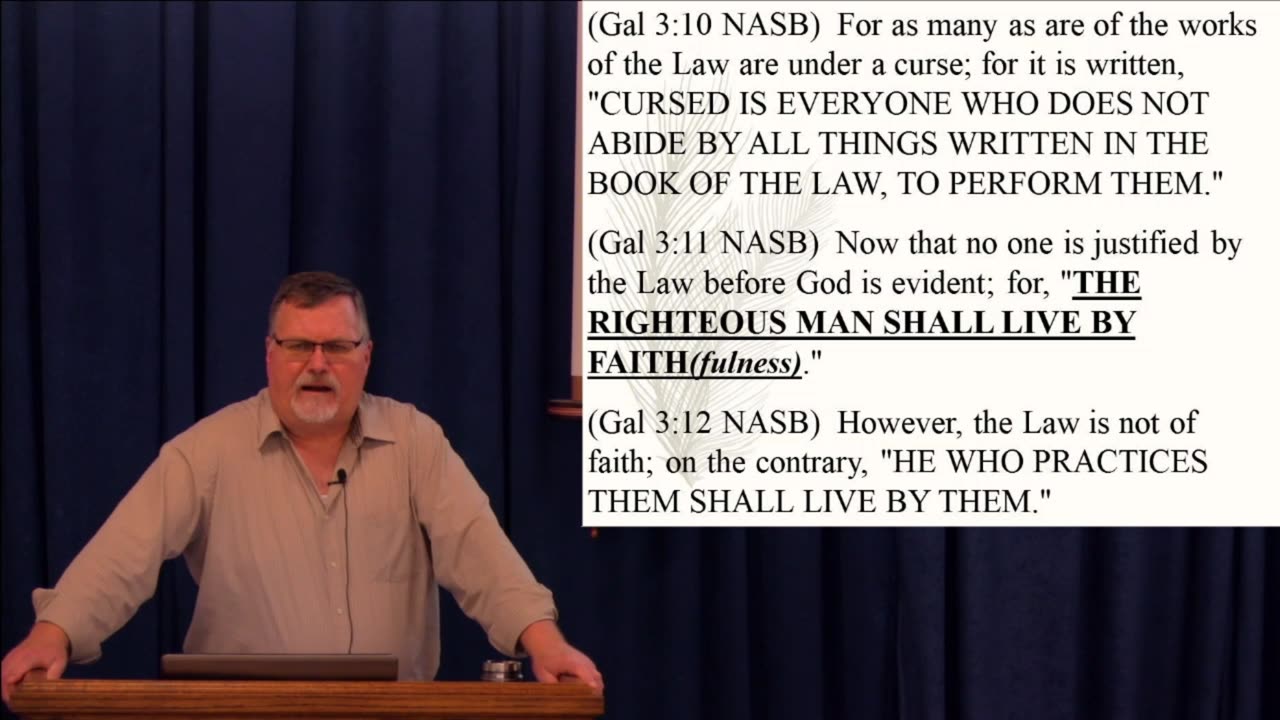Premium Only Content

Control & Manipulation - "faith in order to be saved" They made it mystical, emotional & captivating
One of the most egregious examples of this translational conspiracy (if one can call it that) is the passage in the Tanakh that translates the Hebrew word "emunah" as "faith" Hab 2:4).
Faith - H530. emunah, [53c]; from H539; firmness, steadfastness, fidelity:-- faith(1), faithful(3), faithfully(8), faithfulness(25), honestly(1), responsibility(m)(1), stability(m)(1), steady(1), trust(2), truth(5).
This is the only time in the Tanakh that this word is translated as "faith." The word means "faithfulness" or some derivative thereof.
However, it is translated as "faith" here because it is quoted three times in the Brith Hadasha. Apparently Christian translators simply cannot have people living by faithfulness to the Father and living by faithfulness through Messiah because that commands obedience. The masses can be far better controlled and manipulated by telling them they must have "faith in order to be saved" because it is much more mystical, emotional, captivating, and impossible to fully grasp.
The mystical and mysterious word "faith," should be translated as "faithfulness." when they used the word faith instead of faithfulness, what were they thinking? Conspiracy?
Psa 25:5: The Hebrew word for "truth" is emeth. It is a very telling word because it is not only translated as "truth," but it is also often translated as "faithfulness."
Truth - H571. emeth, [54a]; from H539; firmness, faithfulness, truth:-- correctly(m)(1), faith(1), faithful(2), faithfully(6), faithfulness(10),
This passage is a very interesting one used often in Christianity. The Hebrew word for "faith" is emunah. Faith - H530. emunah, [53c]; from H539; firmness, steadfastness, fidelity:-- faith(1), faithful(3), faithfully(8), faithfulness(25), honestly(1), responsibility(m)(1), stability(m)(1), steady(1), trust(2), truth(5).
This is the only time in the Tanakh that this word is translated as "faith." The word means "faithfulness" or some derivative thereof.
However, it is translated as "faith" here because it is quoted three times in the Brith Hadasha. In the first quote, the word translated as "faith" from the Greek word, pistis, and is used three times. In that passage it only makes sense to be translated as "faithfulness" instead of "faith"
Romans 1:17
In the next passage that Habakkuk 2:4 is quoted in the Brit Hadasha, it only makes sense that it be "faithfulness" also Gal 3:11-12 And lastly Heb. 10:38.
The ONLY reason that the Hebrew word "emunah" is translated as "faith" in Habakkuk 2:4 is because Christian translators do not want the term "faithfulness" (meaning that some action and behavior is required) to be applied to Christianity. They would rather have the mystical, cloudy, vagueness of "faith" to be their marketing tool.
If some did not show faithfulness, does that nullify Elohim's faithfulness? May it never be. In this case, even the Ryrie Study Bible says that the Greek word for "unbelief" means "unfaithful:"
"unbelief. May also mean "were unfaithful.""Pistis is translated almost always as the mystical and mysterious word "faith," when it should be translated as "faithfulness." There are only three times that the Brit Hadasha translates pistis as "faithfulness." This passage and Matt. 23:23. and Galatians 5:22-23. In those three cases, the word commanded action, therefore the emotional word "faith" does not fit.
Faithfulness - G4102. pistis, from G3982; faith, faithfulness:-- faith(238), faithfulness(3), pledge(m)(1), proof(1).
The fact of the matter is that both Greek words "pistis" and "pisteo" that are almost always translated as "faith" and "believe" are actually Greek actions words and not passive emotional words. It is painfully obvious in this verse (Romans 3:3) that "pistis" MUST be "faithfulness", and not "faith."
Actually, it is painfully obvious in all of Scripture that "pistis" should be translated as "faithfulness" or "fidelity" instead of "faith." If the translators of Scripture had done so, they would have taken the mystery and intrigue out of a religion that they had so carefully crafted as deception to the billions of people throughout the centuries.
Look at how the meanings of the most quoted passages change and lose their mystique and become very "real" when we see that all Elohim requires is for us to be faithful to Him by being obedient to His commandments (Torah).
John 3:16, 36, 14-18, Ep. 2:8-10, Romans 10:8-10, John 6:47).
River Valley Torah Assembly
-
 1:12:23
1:12:23
The Bold Lib
15 hours agoSay Something Beyond W/MikeMac: JOKER - Ep.12
50 -
 LIVE
LIVE
LFA TV
15 hours agoLIVE & BREAKING NEWS! | MONDAY 11/3/25
3,391 watching -
 1:30:13
1:30:13
Game On!
13 hours ago $6.64 earnedChiefs Dynasty OVER, New Longest FG RECORD, and Patriots Are Winning The Super Bowl!
18.1K2 -
 LIVE
LIVE
The Bubba Army
3 days agoIS AMERICA OVER TRUMP? - Bubba the Love Sponge® Show | 11/03/25
1,527 watching -
 48:57
48:57
Man in America
18 hours agoThe Sinister Reason They Put Fluoride in Everything w/ Larry Oberheu
362K99 -
 1:06:56
1:06:56
Sarah Westall
15 hours agoAstrological Predictions, Epstein & Charlie Kirk w/ Kim Iversen
99.8K71 -
 2:06:49
2:06:49
vivafrei
1 day agoEp. 289: Arctic Frost, Boasberg Impeachment, SNAP Funding, Trump - China, Tylenol Sued & MORE!
287K215 -
 2:56:28
2:56:28
IsaiahLCarter
19 hours ago $14.64 earnedThe Tri-State Commission, Election Weekend Edition || APOSTATE RADIO 033 (Guest: Adam B. Coleman)
62.7K8 -
 15:03
15:03
Demons Row
14 hours ago $16.29 earnedThings Real 1%ers Never Do! 💀🏍️
77.5K25 -
 35:27
35:27
megimu32
18 hours agoMEGI + PEPPY LIVE FROM DREAMHACK!
196K15